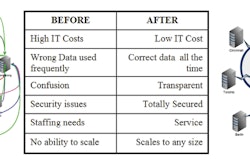Atlanta—Feb. 23, 2012—Aldata, a provider of consumer business optimization solutions is now providing its Shelf Planning and Space Automation solutions to CROSSMARK retail and manufacturing clients.
With Aldata, CROSSMARK, Plano, Texas, is able to collaborate with customers looking to optimize shelf space with store-specific planning. The Aldata solutions provide organizations with the application tools they need to understand their customers' buying habits, tailor product assortments to meet their needs and drive loyalty.
“Retailers need to gain a true understanding of the people that walk into their stores every day to have a realistic chance at lasting growth,” said John Cardamone, Regional Vice President, CROSSMARK. “Aldata's Shelf Planning and Space Automation solutions are critical in helping us customize space planning for each of the stores that stock our clients' brands and optimize shelf space to improve their overall ROI. We chose Aldata as a technology partner because their products deliver the store and shopper insights necessary to uphold our high client service standards, analytic capabilities and the ability to deliver go-to-market solutions.”
Space Automation, a component of the Aldata Category Optimization suite, enables CROSSMARK analysts to create customized planograms that optimize store-level shelf space utilization, decrease planogram creation time and help their clients and retailer partners to increase sales up to 25 percent per category and reduce out-of-stocks.
“CROSSMARK guides some of the most powerful brands in the world to market and we are excited to help their clients achieve success," said Brendan Lowe, President, Aldata North America. “Our solutions empower our clients to achieve the perfect mix of products to meet local shoppers' needs. CROSSMARK will now offer its clients these tailored product assortments to increase customer loyalty and profit margins, and we are thrilled to be working with a company that understands the critical role that merchandising plays in overall business development.”












